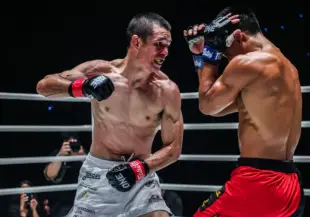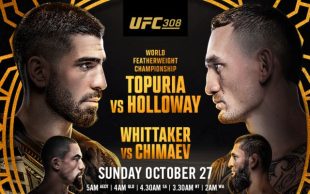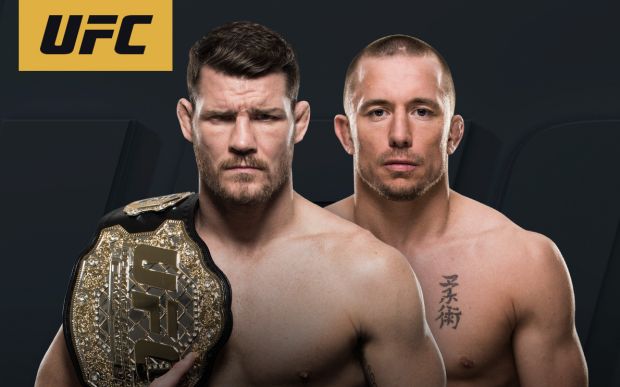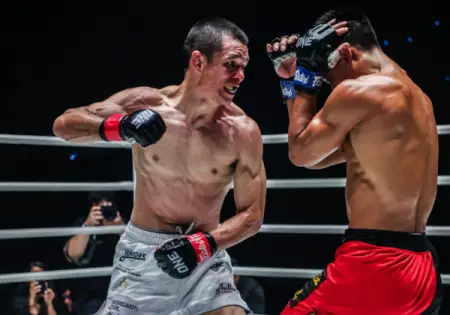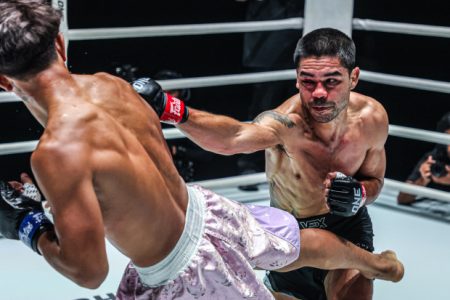Editor’s note: The views and opinions expressed below are those of the author and do not necessarily reflect the views of Fight News Australia, its affiliates and sponsors.
So this is where we are in 2017. A 36- year old career welterweight who has been inactive for more than 3 years, leapfrogging a laundry line of contenders in a higher weight-class that he’s never fought in before, to fight for a belt that he may not defend – or worse, defend against big names instead of legitimate challengers.
Barely 24 hours before possibly the worst welterweight title fight in the history of the UFC, the man who formerly ruled over the division fielded questions at a press conference that marked the end of his hiatus away from the sport.
Georges St Pierre – looking strikingly more enthused than he did in the build up to his final two title defences in 2013 – declared that he had reached the peak of “knowledge, athleticism and wisdom”, and that in his second run in the promotion he wanted “make the biggest fights possible… to make history”.
The “biggest fight possible” in this case is one with middleweight champion Michael Bisping, who sat opposite “Rush” at the press conference and spent most of the 35 minute event hurling profanities at the former 170 pound king.
A perennial contender in the 185-pound weight class for the majority of his decade long run in the UFC, Bisping won the division’s title in a shocking upset some 9 months ago, replacing Chris Weidman on a meagre 13 days notice and knocking out then-champion Luke Rockhold in the first round of their fight at UFC 199.
Since then, his reign over the middleweight division has not been without controversy – in part due to his first title defence coming against no #13 ranked Dan Henderson, who had won just 3 of his last 9 fights in the promotion and been finished in 4 of the 6 losses.
That GSP is his next opponent means he will avoid the legitimate top contenders in his division for a second time in a row, with “Rush” leapfrogging the likes of no #2 ranked Yoel Romero, who was promised the middleweight title shot in January after violently KO’ing Chris Weidman at UFC 205; and no #3 ranked Jacare Souza, who has amassed an incredible 7-1 record against the 185-pound elite since joining the promotion in 2013 – his only loss being to the aforementioned Romero.
Whilst Bisping assured the Las Vegas crowd that he would defend the middleweight crown against the rightful number one contender “six weeks after” his fight with GSP, this is likely to be of little comfort to the 39 year old Romero. For a start, GSP will be unable to compete for at least four month’s due to the USADA drug screening requirements, meaning a minimum 6 months on the shelf for the Cuban in the event that Bisping – the betting underdog – emerges victorious.
More worrying however was GSP’s response to questions about his intentions should he snare the middleweight crown, with the French-Canadian refusing to commit to defending the belt against the division’s best and making vague references to fighting guys with the “highest stock market value”.
For a promotion that has long distinguished itself from other combat sport leagues by the mandate that “the best fight the best”, it’s permissiveness towards – and indeed endorsement of – such a course of action is uncharacteristically cavalier, and representative of the new owners WME-IMG’s entertainment-centric approach to MMA.
Of course, complaints that the UFC have been moving away from meritocratic championship matchmaking, in favour of more profitable contests, are hardly a recent phenomenon. But to pass over the division’s contenders on two, quite possibly three, consecutive occasions – effectively suspending the middleweight division for an entire year or longer – is unprecedented, and moreover displays a callous disregard for the health and longevity of the division.
Whereas fighters and fans have expressed varying degrees of confusion and anger in response to the likes of Chael Sonnen, Alexander Gustafsson or Cody Garbrandt receiving undeserved title shots, there were usually extenuating circumstances that made the matchup slightly more digestible. This was often a dearth of credible challengers, or a particularly compelling narrative or “rivalry” that could be marketed by the UFC’s PR machine.
GSP-Bisping has none of these qualities, and is explicable solely by the former’s ability to generate pay-per-view buys at a time when superstars Conor McGregor and Ronda Rousey are nowhere to be seen.
As Patrick Whitman observed last week, the UFC is gambling that the devaluation of the middleweight title is offset by the potentially huge profits flowing from the GSP-Bisping “super-fight”, but the promotion risks more than just integrity by putting on such an outlandish event.
It might seem advantageous to have a surplus of killers in one weight class, but when they’re continually matched in high-risk fights without a clear pathway to the title, that’s a recipe for discontentment and inertia. As Tony Ferguson said in an interview earlier this week, fighters who make it to the apex of the sport aren’t interested in, and shouldn’t be made to, take steps backwards, so don’t be surprised if we see a drought of meaningful middleweight contests in the near future.
The UFC’s ability to maintain the loyalties of this roster – especially in light of Bellator’s increasingly emboldened and well resourced pursuit of fighters at the end of their UFC contracts – might also be considered. Whilst the shallowness of Bellator’s 185-pound weight class makes this a remote possibility in the short-term, as the UFC’s division continues to expand – buoyed by new additions such as former 170-pound champion Johnny Hendricks and surging Kelvin Gastulem – it’s not hard to imagine some high profile fighters following Rory MacDonald’s lead and jumping ship to win a world title elsewhere.
It is regrettable that GSP, one of the most recognisable faces of the unionisation movement who came out to challenge the UFC’s hegemony on behalf of all UFC fighter under the auspices of the recently formed Mixed Martial Arts Athletes Association (MMAAA) late last year, would also lobby for and agree to a fight that embodies some of the most problematic aspects of the our still fledgling sport.
What is more ironic is that precisely the same treatment that Romero and Jacare are receiving drove at least one of the other MMAAA ambassadors – former bantamweight champion TJ Dillashaw – to lobby on behalf of the association in the first place.
Of course, if GSP was to use a victory over Bisping to agitate for better pay and conditions for all fighters, it could be argued that the whole event had some enduring benefit for the sport beyond WME-IMG’s quarterly profit margins – but the likelihood of that happening is small at best.
Time will tell the precise impact of the match-up on the UFC and the middleweight division more specifically – but at least one GSP fan will be emphatically cheering for Bisping when the two men meet in the cage.
Because a win for GSP is a loss to pretty much everyone else.

